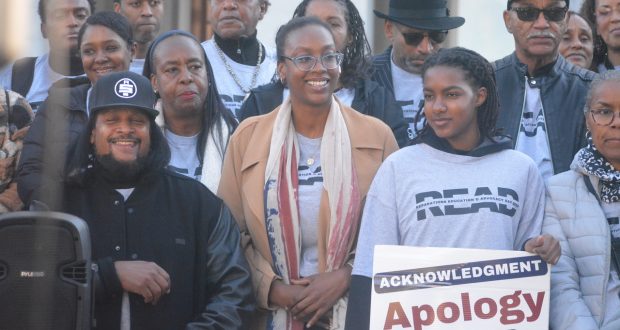By Antonio Ray Harvey | California Black Media
More than 100 reparations advocates and supporters from nearly 20 grassroots organizations across California gathered at the State Capitol on Jan. 7 for the first-ever Reparations Education and Advocacy Day (R.E.A.D) event.
Led by the Coalition for A Just and Equitable California (CJEC), the event took place in the same location where, just a few months ago, advocates protested after two reparations bills where denied a floor vote on the Assembly floor.
“The last time we were here was Aug. 31 and it was a shame (those bills did not get a floor vote),” said Los Angeles-based attorney Kamilah Moore, who served as chairperson of the Task Force to Study and Develop Reparation Proposals for African Americans, established by Assembly Bill (AB) 3121, from May 2021 to June 2023.
Moore told California Black Media (CBM), “This day speaks to the resiliency of descendants of American slaves. We are not taking no for an answer. We came right back once the doors opened to the capitol. We came back and we mean business.”
This time, the advocates say, they returned to Sacramento with a message and a mission to educate others that they will not be deterred in their efforts to reintroduce the reparations bills in the Legislature this year.
CJEC is California’s statewide leading grassroots of advocates, organizers, and mobilizers for reparations and reparative Justice. They have been meeting privately after two bills Authored by former Sen. Steven Bradford (D-Inglewood) — Senate Bill (SB) 1403 and SB 1330 — stalled in the Assembly.
SB 1403 proposed the creation of a new state agency called the California American Freedmen Affairs Agency (CAFAA). It would’ve been accountable for determining eligibility for reparations and administering government processes related to compensation.
SB 1331 was designed to build an account for reparations in the State Treasury for the purpose of funding reparations policies approved by the Legislature and the Governor.
Chris Lodgson, leader of CJEC, and other advocates visited the offices of almost the entire body of120 State Senators and Assemblymembers, urging them to introduce or support 2025 Reparations bills. The group spent the day knocking on the doors of the lawmakers housed in the State Capitol Annex Swing Space.
Marcus Champion, a Los Angeles community activist, photojournalist, and reparations advocate made the trek from Southern California to Sacramento. He shared his impression of the roles of the lawmakers, particularly members of CLBC.
During the last legislative session, leaders of the CLBC cited that they had “structural” concerns about the reparation bills. Therefore, they voted against advancing the legislation for a floor vote by their colleagues.
The advocates say they expect to bring the bills back under a new leadership that includes CLBC chairperson Sen. Akilah Weber-Pierson (D-La Mesa) and vice chair Issac Bryan (D-Ladera Heights).
“It was a good day to send a message to the folks inside that we are here for business,” said Champion. As we have mentioned several times, Aug. 31 was unacceptable. We’re going to make sure that doesn’t happen again.”
Champion continued, “The legislators in there are supposed to represent us and if they can’t get the job done, we will find folks who can.”
Advocates say the reparations bills they support are proposing a state agency to verify lineage-based reparations eligibility; a reparations fund in the state Treasury; and funding for reparations activities in the 2025 Budget, including direct cash payments to qualifying Black Californians and restitution and compensation for stolen property.
Lodgson said that they are prepared to have discussions with the CLBC, Republicans, and Democrats as a whole to form a consensus to support the bills.
Lodgson and others who support reparations for Black Californians based on lineage say that they are willing to discuss their goals with other factions of reparation supporters who advocate for compensation to be based on race.
If approved, lineage-based reparations would be limited to Black Californians who can trace their ancestry back to enslaved or free Black people in the United States before 1900.
Race-based reparations would open up the eligibility pool for reparations to include anyone in California who identifies as Black as opposed to Californians with a direct connection to a person who was enslaved in the United States.
“Our specific work and our specific focus is on those of us whose ancestors were enslaved and emancipated in this country,” Lodgson told CBM. “We are willing to work with anybody who supports that, but we are not moving off that square. We are our own people. No one has done what we’ve done for this country.”
 Westside Story Newspaper – Online The News of The Empire – Sharing the Quest for Excellence
Westside Story Newspaper – Online The News of The Empire – Sharing the Quest for Excellence





